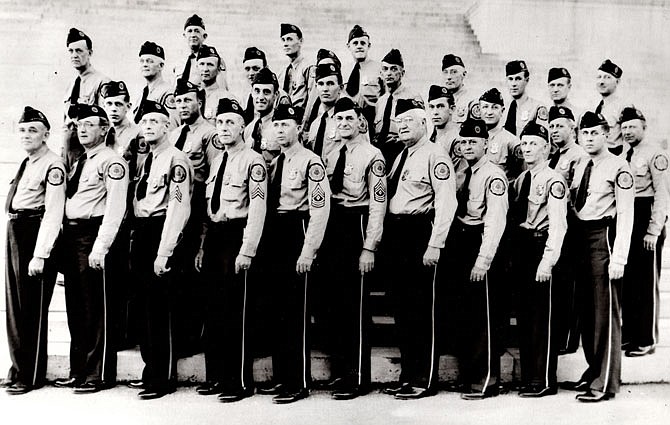On the evening of May 3, 1939, a major fire consumed the former Madison Hotel in Jefferson City. The flames spread "rapidly through the 70-year-old structure," which "at its height threatened the governor's mansion and a block of business buildings along one of the capital's principal streets," the St. Louis Star and Times reported the day following the event.
While emergency crews scrambled to the site, Harry Mackey was serving as police chief for the Jefferson City Police Department. What he observed were significant traffic difficulties encountered by his police force because of sightseers crowding the surrounding streets to watch the event unfold.
Mackey later affirmed the fire demonstrated the local police force "was not adequate to handle emergencies, and his men were often over-taxed in handling state affairs, thus the need for some properly trained assistants," the Jefferson City News and Tribune reported Sept. 5, 1943.
The newspaper went on to explain the police chief then "made preliminary arrangements with the (Jefferson) City Council to enact the necessary ordinances to create an emergency police force" comprised of a number of veterans - many of whom had served in World War I. Thus was the birth of what became known as the American Legion Police of Jefferson City.
Permanent officers were soon elected for the voluntary police force, which consisted of a police chief, captain and adjutant. The captain then selected lieutenants, sergeants, corporals and patrolmen. Each member purchased a badge to wear while on active duty and were authorized to carry a sidearm.
Sworn in by a local judge, members of the American Legion Police were "full-fledged Peace Officers of the City of Jefferson," noted a brief history of the organization that has been preserved in the files of the American Legion Post No. 5.
The history also said the voluntary police force "operates under the direct supervision of the Chief of Police of Jefferson City and are only on duty at his call. While each member of the Legion Police is a duly authorized police officer and has the power of arrest at any time, great care has been taken that the privilege is never abused."
The auxiliary police were engaged in a variety of functions, such as assisting the Cole County Draft Board in investigations and physical examinations in addition to providing support for the draft registrations that occurred during World War II. However, the American Legion Police would augment and, on occasion, replace the full-time city police force.
When President Harry S Truman and Winston Churchill arrived in Jefferson City prior to their visit to Westminster College in Fulton on March 5, 1946, the American Legion Police supplemented the city's full-time police force. The American Legion volunteers also helped direct traffic when the Freedom Train made a one-day visit to the city in June 1948.
Another seminal moment in the history of their service came during the riots at the Missouri State Penitentiary in Jefferson City in 1954. While Missouri Highway Patrol officers stormed the grounds to put an end to the disturbance, the Legion police "handled most of the traffic on the streets adjacent to the problem area," the Jefferson City Post-Tribune reported in its Oct. 27, 1954, edition.
Because of the valuable services provided by the Legion Police during the riots, the newspaper further noted, "all members of the unit have been assigned definite points, which they will man in the area around the penitentiary in the event of future trouble."
"The (American Legion Police) has been working home games since the football season started," the Jefferson City Post-Tribune said on Oct. 25, 1955. "The entire force will be on duty Nov. 4 while regular members of the police department attend the annual policeman's ball."
Oftentimes, respected business and community leaders maintained an association with the Legion police, including the late William Laux, who was reelected a number of times to serve as the organization's police chief. Laux served as a radio operator and instructor with the U.S. Army in World War II and was employed full-time with the Central Missouri Trust Company.
Another local notable was the late Lester "Chub" Schulte, a U.S. Army veteran of World War II and retired mail carrier. Schulte could often be seen directing traffic at the corner of East Dunklin and Madison Streets and was so fluid and practiced in his duties, the Missouri Highway Patrol recorded video of him to use the footage in training films for cadets.
Wyman Basinger, a long-time sheriff for Cole County and twice-wounded Marine of World War II, used his experience with the American Legion Police as part of his credentials when first running for the position of sheriff in 1968. At the time, Basinger had served with the auxiliary police force for nearly two decades.
The American Legion Police continued to support law enforcement efforts into the mid-1970s, at which time state funding for local police departments increased to the level additional full-time police officers could be hired. Regardless, the years of support given by the auxiliary police force was honored and recognized by the community in which it served.
"The city owes a vote of thanks to the Legion police for their splendid work during the past," the Jefferson City Post-Tribune wrote Oct. 31, 1942. "During the period this auxiliary police force has existed, services of its members to the city have been of immeasurable value. It is likely that debt will grow in the years to come."
Jeremy P. Amick writes on behalf of the Silver Star Families of America.

